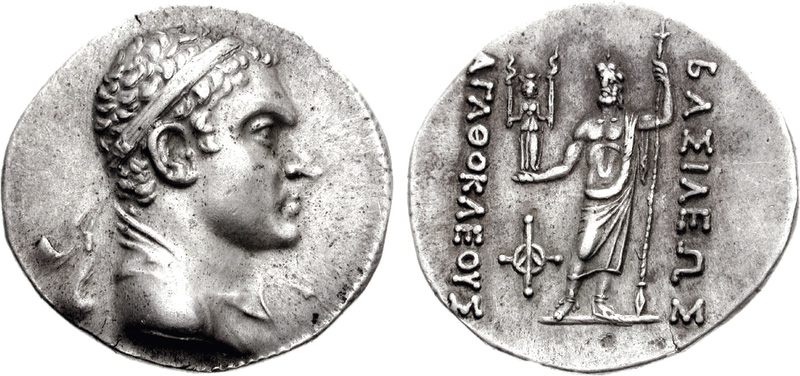|
Agathocles
Agathocles (Greek: ) is a Greek name, the most famous of which is Agathocles of Syracuse, the tyrant of Syracuse. The name is derived from , ''agathos'', i.e. "good" and , ''kleos'', i.e. "glory". Other personalities named Agathocles: *Agathocles, a sophist, teacher of Damon * Agathocles (writers), was the name of a number of ancient writers, including an ancient historian referred to by Pliny and Cicero *Agathocles of Pella, father of Lysimachus *Agathocles, one of the sons of Agathocles of Syracuse from his first marriage *Agathocles (son of Lysimachus), the son and heir of Lysimachus *Agathocles, grandson of Agathocles of Syracuse with his third wife Theoxena of Syracuse *Agathocles of Egypt, son of the above named Agathocles; guardian of Ptolemy V Epiphanes and brother of Agathoclea, mistress of Ptolemy IV Philopator *Agathocles of Bactria, an Indo-Greek king who ruled about 185 BC See also *''Agathocle'', a play by Voltaire *Agathocles (band) Agathocles is a Belgian politi ... [...More Info...] [...Related Items...] OR: [Wikipedia] [Google] [Baidu] |
Agathocles Of Syracuse
Agathocles ( grc-gre, Ἀγαθοκλῆς, ''Agathoklḗs''; 361–289 BC) was a Greek tyrant of Syracuse (317–289 BC) and self-styled king of Sicily (304–289 BC). Biography Agathocles was born at Thermae Himeraeae (modern name Termini Imerese) in Sicily. The son of a potter who had moved to Syracuse in about 343 BC, he learned his father's trade, but afterwards entered the army along with his brother Antander. In 333 BC he married the widow of his patron Damas, a distinguished and wealthy citizen. He was twice banished for attempting to overthrow the oligarchical party in Syracuse. In 317 BC he returned with an army of mercenaries under a solemn oath to observe the democratic constitution which was established after they took the city. Having massacred the oligarchs and the richest of the citizenry, he thus made himself master of Syracuse, and he created a strong army and fleet and subdued the greater part of Sicily. War with Carthage follo ... [...More Info...] [...Related Items...] OR: [Wikipedia] [Google] [Baidu] |
Agathocles Of Bactria
Agathocles I Dicaeus ( grc, Ἀγαθοκλῆς Δικαῖος, Agathoklēs Dikaios, the epithet means "the just") was a Greco-Bactrian/Indo-Greek king, who reigned between around 190 and 180 BC, likely of the dynasty of Diodotus I, due to his commemoration of Antiochus Nicator. Accounts and discovery There is a near-complete lack of written sources except an extensive coinage. Agathocles was first discovered by Johann Martin Honigberger in 1834, with hordes of coins being discovered at a rapid pace. No sooner had Desiré-Raoul Rochette held him to be the founder of the Bactrian dynasty than he was rejected by Christian Lassen, who felt that Agathocles was a contemporary of Demetrius and Eucratides I. Biography Agathocles' father may have been Diodotus II, and he would therefore have been illegitimate. Agathocles ruled c. 185 BC and was probably the immediate successor of Pantaleon; he was a contemporaneous relative (maybe, son) of Demetrius I of Bactria, Demetrius I, who ... [...More Info...] [...Related Items...] OR: [Wikipedia] [Google] [Baidu] |
Agathocles (band)
Agathocles is a Belgian political grindcore band. Founded in 1985, it is mainly known for producing a large quantity of split seven-inch EPs. They play a style of grindcore they have dubbed "mincecore". Their lyrical themes have focused on anti-fascism, animal liberation and anarchism. All of its members are vegetarians. Retrieved 7 March 2021. Their lineup has changed numerous times since they first started, the only consistent member being Jan Frederickx (also known as Jan AG). Biography 1980s Agathocles was formed in the Belgian city of Mol, aspiring to sound like bands such as |
Agathocles (grandson Of Agathocles Of Syracuse)
Agathocles (Greek: ) is a Greek name, the most famous of which is Agathocles of Syracuse, the tyrant of Syracuse. The name is derived from , ''agathos'', i.e. "good" and {{lang, grc, κλέος, ''kleos'', i.e. "glory". Other personalities named Agathocles: *Agathocles, a sophist, teacher of Damon *Agathocles (writers), was the name of a number of ancient writers, including an ancient historian referred to by Pliny and Cicero *Agathocles of Pella, father of Lysimachus *Agathocles, one of the sons of Agathocles of Syracuse from his first marriage *Agathocles (son of Lysimachus), the son and heir of Lysimachus *Agathocles, grandson of Agathocles of Syracuse with his third wife Theoxena of Syracuse *Agathocles of Egypt, son of the above named Agathocles; guardian of Ptolemy V Epiphanes and brother of Agathoclea, mistress of Ptolemy IV Philopator *Agathocles of Bactria, an Indo-Greek king who ruled about 185 BC * Agathocles of Samos, a Greek writer. He wrote at least one book, which was ... [...More Info...] [...Related Items...] OR: [Wikipedia] [Google] [Baidu] |
Agathocles Of Egypt
Agathocles ( grc-gre, Ἀγαθοκλῆς, flourished 3rd century BC, died 203/202 BC) was a Ptolemaic minister and together with his sister Agathoclea was very close to Egyptian king Ptolemy IV Philopator (). Life Agathocles through his father was a distant relation of the Ptolemaic dynasty. Agathocles was the son born to Oenanthe of Egypt from her first husband Agathocles and also had two unnamed sisters. His paternal grandmother Theoxena of Egypt, was a Syracusan princess and Theoxena’s mother, also named Theoxena was a Macedonian noblewoman, who was the second older maternal half-sister of Ptolemy II Philadelphus (). Polybius states he had other relations who served the Ptolemaic dynasty: Nico or Nicon, a nauarch under Ptolemy IV; Philo and Philammon, appointed Libyarch of Cyrene by himself. Agathocles and his sister were introduced to Ptolemy IV by their ambitious mother. Despite Ptolemy IV marrying his sister Arsinoe III in 220 BC, Agathoclea continued to be his favouri ... [...More Info...] [...Related Items...] OR: [Wikipedia] [Google] [Baidu] |
Agathocles Of Pella
Agathocles ( el, Ἀγαθοκλῆς, flourished 4th century BC) was a Greek nobleman who was a contemporary to King Philip II of Macedon (reigned 359 BC–336 BC). Agathocles was a Thessalian serf Serfdom was the status of many peasants under feudalism, specifically relating to manorialism, and similar systems. It was a condition of debt bondage and indentured servitude with similarities to and differences from slavery, which developed ... from Krannonas, Crannon.Heckel, ''Who’s who in the age of Alexander the Great: prosopography of Alexander’s empire'', p.153 His father’s name may have been Alcimachus. It was through his flattery that Agathocles became an intimate friend of Philip II,Lund, ''Lysimachus: A Study in Early Hellenistic Kingship'', p.2 who raised him to high rank. Agathocles was granted Macedonian citizenship for himself and his family. Agathocles shared in Philip II’s councils and Phillip II sent him to deal with the Perrhaebi and Agathocles took cha ... [...More Info...] [...Related Items...] OR: [Wikipedia] [Google] [Baidu] |
Agathocles (writers)
Agathocles ( grc-gre, Ἀγαθοκλῆς; fl. 3rd century BC) was a Greek historian who wrote a history of Cyzicus () in the Ionic dialect. He is called by Athenaeus both a Babylonian and a Cyzican. He may originally have come from Babylon, and have settled at Cyzicus. The first and third books are referred to by Athenaeus. The time at which Agathocles lived is unknown, and his work is now lost; but it seems to have been extensively read in antiquity, as it is referred to by Cicero, Pliny, and other ancient writers. Agathocles also spoke of the origin of Rome. The scholiast on Apollonius cites Memoirs () by an Agathocles, who is usually supposed to be the same as the above-mentioned one. There are several other writers of the same name, whose works are lost to us but are mentioned by later writers: *Agathocles of Atrax, who wrote a work on fishing. *Agathocles of Chios, who wrote a work on agriculture. *Agathocles of Miletus, who wrote a work on rivers. *Agathocles of Samos ... [...More Info...] [...Related Items...] OR: [Wikipedia] [Google] [Baidu] |
Agathocles (son Of Lysimachus)
Agathocles ( grc-gre, Ἀγαθοκλῆς; between 320–310s – 284 BC) was a prince of Macedonian and Thessalian descent. He was the son of Lysimachus and his first wife, Nicaea a daughter of Antipater, the regent of Alexander the Great's Empire. His full blooded siblings were his younger sisters Eurydice and Arsinoe I. Life In 292 BC Agathocles was sent by his father against the Getae, but was defeated and taken prisoner. Dromichaetes, the king of the Getae, sent him back to his father as a goodwill gesture; despite this, Lysimachus marched against the Getae, but was himself taken prisoner. He was released by Dromichaetes after a promise of loyalty secured by several high-born hostages, and the hand of Lysimachus' daughter in marriage. There are conflicting versions of this sequence of events as some ancient historians recount that it was only Agathocles, and according to others only Lysimachus, who was taken prisoner. In 287 Agathocles was sent by his father against Dem ... [...More Info...] [...Related Items...] OR: [Wikipedia] [Google] [Baidu] |
Agathocle
'' Agathocle '' is the last dramatic tragedy by Voltaire. It was written by the 84-year-old author in 1777 almost simultaneously with the tragedy '' Irène'', only months before he died. It was not performed on the public stage until the first anniversary of his death. Composition Voltaire sent a copy of the manuscript to his friend d'Argental in August 1777, describing it to him as 'too cold and insipid' and urging him not to let anyone else see it. A month later, after further work, he was more confident about it, and hoped that the marvel of a play from an 84-year-old would soften the harshness of the critics. However of his two new plays he gradually came to consider that ''Irène'' would work better on stage, and it was indeed that work which was rehearsed and performed while he was alive. He wrote again to d'Argental on 25 October to say that he felt ''Agathocle'' was only suitable for performing 'at the Olympic Games of some school of Platonic philosophy. I'm sending you ... [...More Info...] [...Related Items...] OR: [Wikipedia] [Google] [Baidu] |
Damon Of Athens
Damon ( grc-gre, Δάμων, ''gen''.: Δάμωνος), son of Damonides, was a Greek musicologist of the fifth century BC. He belonged to the Athenian deme of Oē (sometimes spelled "Oa"). He is credited as teacher and advisor of Pericles. Music Damon's expertise was supposed to be musicology, though some believed this was a cover for a broader influence over Pericles' political policy. For instance, Damon is said to have been responsible for advising Pericles to institute the policy of paying jurors for their service; this policy was widely criticized, and Damon is said to have been ostracized for it (see the Aristotelian '' Athenaion Politeia''), probably sometime in last third of the 5th century BCE. Plato invokes Damon many times in the ''Republic'' as the musical expert to be deferred to concerning the details of rhythmical education. In Plato's '' Laches'', Damon is said to have been a student of Prodicus and of Agathocles. The former was an unabashed sophist, while the ... [...More Info...] [...Related Items...] OR: [Wikipedia] [Google] [Baidu] |
Greek Language
Greek ( el, label=Modern Greek, Ελληνικά, Elliniká, ; grc, Ἑλληνική, Hellēnikḗ) is an independent branch of the Indo-European family of languages, native to Greece, Cyprus, southern Italy (Calabria and Salento), southern Albania, and other regions of the Balkans, the Black Sea coast, Asia Minor, and the Eastern Mediterranean. It has the longest documented history of any Indo-European language, spanning at least 3,400 years of written records. Its writing system is the Greek alphabet, which has been used for approximately 2,800 years; previously, Greek was recorded in writing systems such as Linear B and the Cypriot syllabary. The alphabet arose from the Phoenician script and was in turn the basis of the Latin, Cyrillic, Armenian, Coptic, Gothic, and many other writing systems. The Greek language holds a very important place in the history of the Western world. Beginning with the epics of Homer, ancient Greek literature includes many works of lasting impo ... [...More Info...] [...Related Items...] OR: [Wikipedia] [Google] [Baidu] |



